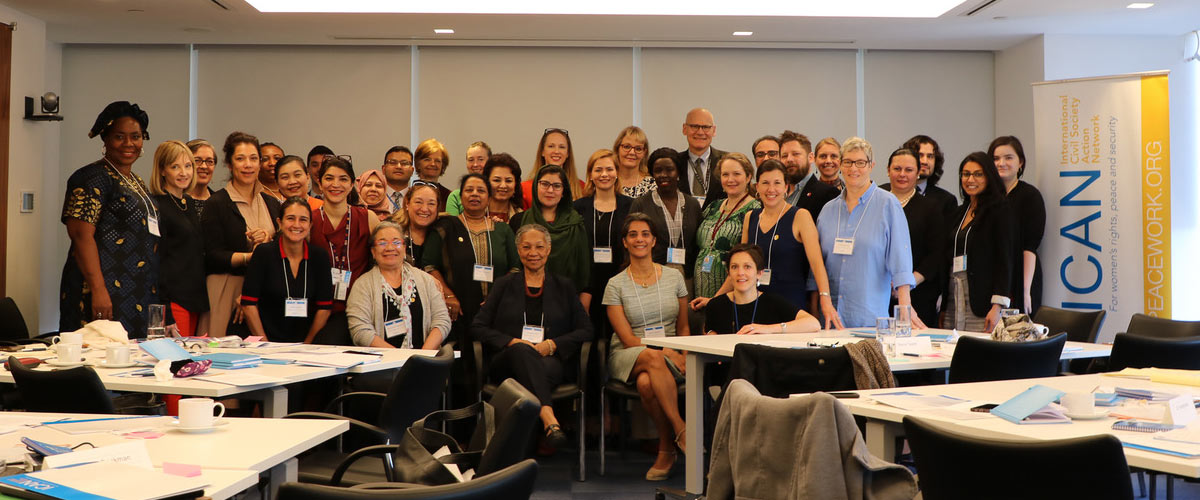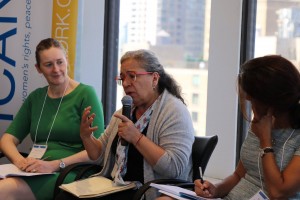
The International Civil Society Action Network (ICAN) in partnership with the Permanent Missions of Canada, the United Kingdom, Norway and South Africa to the United Nations hosted a 2-day expert-level working group meeting (EGM) in New York on May 21-22. Funded by Global Affairs Canada (GAC) and the UK Commonwealth Office (FCO), the meeting covered issues ranging from protecting and recognizing women peacebuilders as a sector, to funding and strategy for inclusive implementation of peace agreements.
A mix of government representatives, international NGOs, UN agencies, academia, and women-led civil society organizations participated in a total of eight sessions. Most sessions featured a panel of speakers from different sectors, including 11 civil society leaders, many of whom are members of ICAN’s Women’s Alliance for Security Leadership (WASL).
In her opening remarks, ICAN’s Executive Director Sanam Naraghi Anderlini stressed the importance of recognizing women peacebuilders as a key sector of civil society. Helena Gronberg, ICAN’s Better Peace Initiative (BPI) program director also emphasized the value of bringing together all the different stakeholders to envision strategies for peacebuilding. “At ICAN and through the Better Peace Initiative, we’ve looked at gender responsiveness in peace treaties. There is already a lot of information on the why, so we are focusing on the how,” she said.
If we do not regard peace activists and peacebuilders as a pillar, then, we are missing a glue that could reweave the social fabric.
-Sanam Naraghi Anderlini
In the session “Transitions and Fragility,” Henk-Jan Brinkman, Chief of the UN Peacebuilding Strategy and Partnerships Branch of the Peacebuilding Support Office (PBSO) commented on the valuable, in-depth knowledge that local actors – particularly women – and civil society as a whole bring to peacemaking. Cerue Konah Garlo, peace activist from Liberia, emphasized the role of women peacebuilders  prior, during and after conflict. “What policymakers and INGOs fail to recognize is that when men are fighting, women are leading the community. They possess recognition and knowledge,” she said. Bandana Rana, coordinator at the 1325 Action Group in Nepal, commented on the need to increase collaboration between stakeholders saying that “for peacebuilding to be successful, there must be a vibrant civil society as well as government openness, funding and interest in partnering with civil society throughout the entire process.”
prior, during and after conflict. “What policymakers and INGOs fail to recognize is that when men are fighting, women are leading the community. They possess recognition and knowledge,” she said. Bandana Rana, coordinator at the 1325 Action Group in Nepal, commented on the need to increase collaboration between stakeholders saying that “for peacebuilding to be successful, there must be a vibrant civil society as well as government openness, funding and interest in partnering with civil society throughout the entire process.”
Based on key ideas from previous exchanges, the last session of day one “Practical Steps Towards Meaningful Inclusion and Ensuring Protection” involved small thematic group discussions. Each group then presented the outcome of their conversations to all participants while a graphic recorder – who was active throughout the symposium – created colorful live illustrations of the essential points raised by each of them.

Rosa Emilia Salamanca – CIASE, Colombia
The distinction between women peacebuilders and human rights defenders became a consistent theme throughout the symposium. Rosa Emilia Salamanca, WASL member from CIASE in Colombia reinforced this notion in the session “Reality Check – Threats & Backlash Against Women Peacemakers/CSOs” by pointing out that “even if some threats faced by the two groups are similar, the causes and the solutions are different.” During the same session, Stacey Schamber, senior program officer, gave a presentation on the physical, financial, legal and political, and sociocultural threats faced by women peacebuilders drawn from last year’s ICAN’s annual forum. Jennifer Freeman, Associate Director for PeaceMakers Programs at the Kroc Institute for Peace and Justice also highlighted this distinction in her virtual presentation titled “The Role of Global Partners in Protecting Women Peacebuilders.”
We need to talk about what security looks like from women’s perspective.
-Rosa Emilia Salamanca
The issue of core funding was analyzed as one of the biggest challenges that women peacebuilders encounter while doing their work. France Bognon, ICAN’s Innovative Peace Fund program director and other participants commented on the importance of securing this funding to assuage many of the threats that women peacebuilders face in combination with other forms of protection and support. Additionally, the fundamental role of the media and civil society as the fourth and fifth pillars of statebuilding was a key idea highlighted throughout the two days.
Marking the end of the symposium, the closing reception at the Permanent Mission of Norway to the UN included opening remarks by Ambassador and Deputy Representative of Norway to the UN, Mari Skaare, who highlighted the role of civil society and women peacebuilders in leading and encouraging accountability in peace processes, followed by interventions from Muna Luqman from Food 4  Humanity in Yemen and Dr. Pauline Riak from the University of Juba in South Sudan.
Humanity in Yemen and Dr. Pauline Riak from the University of Juba in South Sudan.
Based on the findings and recommendations of the symposium, ICAN and partners will develop guidance to ensure the recognition, inclusion and protection of women peacebuilders as a sector of statebuilding. In the words of Sanam Naraghi Anderlini: “In every society, you see people emerging who become the peace activists and peacebuilders, and if we do not regard them as a pillar, then, we are missing a glue that could reweave the social fabric. This sector is at the heart and soul of the 1325 agenda.”
